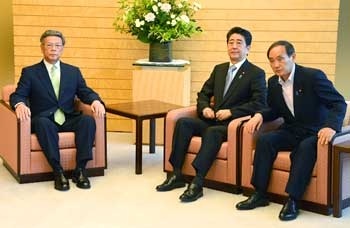In wake of murder, Governor Onaga requests meeting with President Obama

Governor Takeshi Onaga (left) protests to Prime Minister Shinzo Abe (center) and Chief Cabinet Secretary Yoshihide Suga regarding the recent murder case involving a U.S. military employee at the Prime Minister’s Official Residence on May 23
May 24, 2016Ryukyu Shimpo
Regarding the recent arrest of a U.S. military employee on suspicion of disposing of a woman’s body, Okinawa Governor Takeshi Onaga met with Japanese Prime Minister Shinzo Abe on May 23 at the Prime Minister’s Official Residence in Tokyo. Onaga protested the incident, saying, “The crime occurred due to the presence of U.S. bases in Okinawa. I cannot suppress my deep anger and sadness.” He strongly petitioned the national government to revise the U.S.-Japan Status of Forces Agreement in order to prevent future crimes and accidents involving U.S. military personnel and affiliated persons. Onaga simultaneously requested that Abe facilitate a meeting between Onaga and U.S. President Obama, who will be visiting Japan starting May 26. “In order to protect the lives and property of the people in Okinawa, and to protect the safety and security of our children and grandchildren, I hope to be allowed the opportunity to speak directly to President Obama,” Onaga told Abe.
After the meeting, Onaga described his discussion with Abe to the press. The meeting lasted around fourteen minutes, and neither party spoke during the opening segment that was open to the press. From the national government side, Chief Cabinet Secretary Yoshihide Suga also joined the meeting.
During the meeting, Governor Onaga criticized both the U.S. and Japanese governments for their inability to implement effective measures to prevent recurring incidents, saying, “It is unforgivable. I have heard promises to enforce discipline and thoroughly prevent recurrences hundreds of times over the past several decades, but nothing has changed in the slightest.” He expressed outrage regarding the Status of Forces Agreement, which allows special privileges to U.S. military personnel and affiliated persons, saying, “It seems people say that Japan’s independence from the United States is a myth.” He argued the necessity of revising the Status of Forces Agreement in order to effectively prevent the recurrence of crimes.
Prime Minister Abe explained how the government has been addressing the situation, describing its measures to prevent recurrences and the protest it made to U.S. Ambassador to Japan Caroline Kennedy. “I am extremely outraged by this selfish and utterly despicable crime. I intend to call on President Obama to deal firmly with the matter,” said Abe. He expressed his intent to bring up the incident at his meeting with Obama at the Ise Shima G7 summit, but did not mention Onaga’s request to meet with Obama himself.
Speaking to the press after the meeting, Suga expressed a negative view toward the realization of the meeting with President Obama requested by Onaga, saying, “It is only natural that the central government be in charge of negotiating national security and diplomatic issues.”
When asked what he thought about the national government’s negative view toward his request for a meeting with Obama, Onaga said, “[The anger of the Okinawan people] has reached such a point of explosion that [we] cannot keep it bottled in any longer.” He referenced the example of the U.S. military’s failure to adhere to operational regulations agreed upon by the U.S. and Japanese governments, such as regulatory measures to mitigate noise pollution from aircraft, and argued for the need for Okinawa prefectural government representatives to negotiate directly with the United States government.
(English translation by T&CT and Sandi Aritza)
Previous Article:International Academic Conference in China considers shared historical recognition of the Ryukyu Kingdom
Next Article:Onaga asks, “Do you not think that under the U.S.-Japan Status of Forces Agreement, Japan’s independence is a myth?”
[Similar Articles]
- Obama not apologizing for alleged murder of Okinawan woman by ex-marine
- Editorial: At summit, U.S. and Japanese heads of state showed no will to prevent crime
- Onaga asks, “Do you not think that under the U.S.-Japan Status of Forces Agreement, Japan’s independence is a myth?”
- Onaga takes a cautious stance toward new crime prevention measures: “The problem is the overwhelming concentration of bases”
- Doubts raised regarding the accuracy of a quotation from U.S. president Obama’s remarks about the Futenma relocation issue
 Webcam(Kokusai Street)
Webcam(Kokusai Street)


